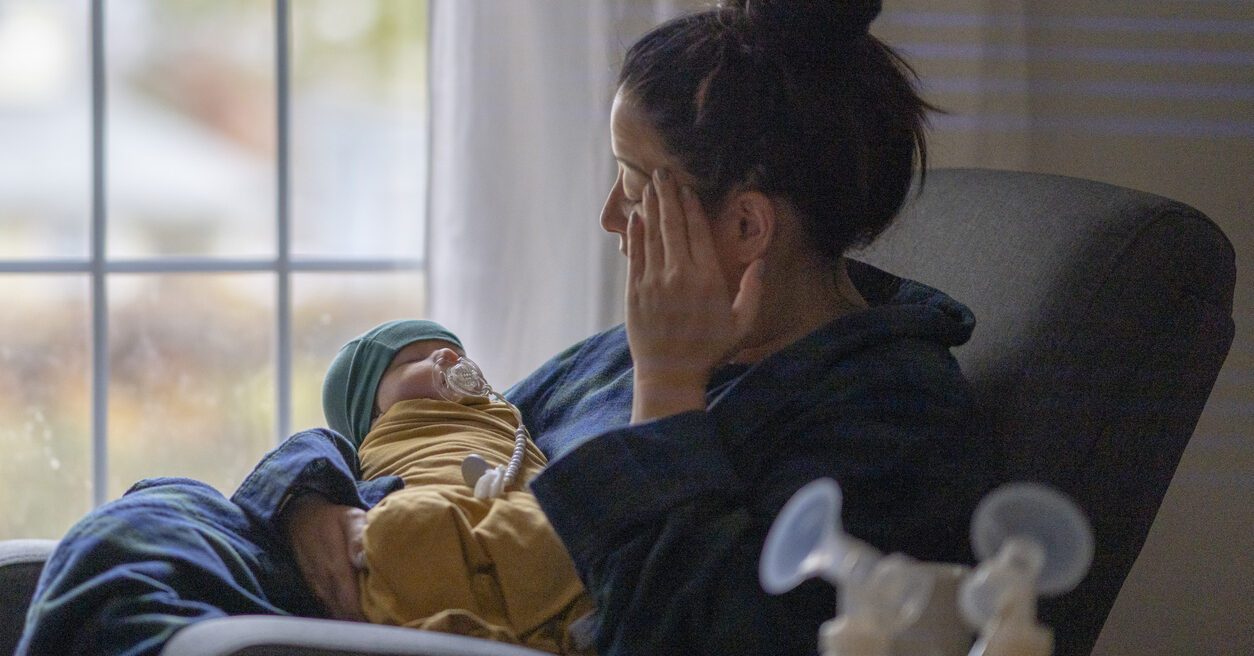Postpartum Depression: How to Help Your Wife
This article is based on scientific evidence and clinical experience, written by a licensed professional and fact-checked by experts.
Posted: July 12, 2022
Estimated reading time: 9 minutes
In This article

Postpartum depression is for real. As a husband it can be hard to know how to support your wife through this struggle. In this article you’ll learn how to help her from a licensed counselor.
As a new or experienced dad, you were worried about lack of sleep, diaper changes, and late-night feedings. For many dads, the last thing you expect or want to see is your wife struggling with symptoms of postpartum depression. You may be very concerned about your wife and want to help, but simply do not know how.
First, take a deep breath. The fact that you are looking for resources and wanting to know ways to help signifies your love and support of your wife. The following list of suggestions are ways you can support and care for your wife as she works through treatment and recovery for postpartum depression.
Communication with PPD
The redundancy is on purpose. Depression promotes isolation which is detrimental to recovery. You may be thinking you try to communicate with your wife, but it seems you are not on the same page. Or maybe, communication has stopped and both of you are just surviving. Please, don’t force your wife to communicate, but leave the doors open for communication. Here are a few pointers (Kleiman & Davis Raskin, 2013):
Avoid trying to “fix it”
When there is a problem, you fix it, right? In this situation, looking at your wife’s postpartum depression as a problem will not be helpful. Your wife, as a result of the depression, already feels like a burden, something that needs to be fixed. If you approach the situation (or her) as something needing fixed, you will be unintentionally confirming her belief she is a burden.
Listen and Validate
Rather than having a fix it mentality, your focus should be on listening to understand and validate your wife. When she shares her emotions, thoughts, and experiences, she is desiring to feel connected and understood by you. A few ways to show you are listening and trying to understand are giving your full attention, looking into your wife’s eyes, reflecting back what you hear, and asking if your wife feels understood. You might ask, “Am I getting it?” or “Do you feel understood because I really want to be here for you.”
Ask rather than mind read
You are reading this article because you want to be helpful to your wife. Therefore, you may try to guess or read your wife’s mind on what she needs in the moment. While you have great intentions, it will be more beneficial for you and your wife if you ask her what she needs in the moment. When you ask what she needs, this includes emotional and physical needs, house work, and with your new baby.
Encourage Your Wife To Seek Help For Postpartum Depression
With psychotherapy and medication, postpartum depression is a treatable diagnosis. One of the most important ways you can help your wife is encourage she speak with her doctor about her symptoms. After your wife’s doctor has made recommendations and referrals, encourage and support your wife to attend these appointments. This may look like attending the appointments with your wife or making sure you are available to watch your child(ren) when your wife has appointments.
While we have come a long way, unfortunately, there is still a stigma attached to mental illness and seeking help. Your wife will be experiencing a multitude of different emotions. It is important to communicate to your wife you are here for her and want her to take care of herself in this time. If you are supportive, encouraging, and accepting of your wife’s diagnosis and treatment, it will help in reducing your wife’s guilt or shame in regard to postpartum depression.
Helping with Daily Tasks
A big source of stress for women who have just had a baby is the added responsibilities within the home and taking care of the baby. When you take initiative to complete a household task your wife would normally complete, it indicates you care about her and the everyday tasks that fill her day. Also, you can encourage your wife to take a break. Offering to take a shift of feeding, changing, and bathing your new baby are tasks you can complete to take pressure off of your wife.
If you are unsure of what would be most helpful, initiate a conversation and ask. Initiating and remembering to complete household tasks gives your wife breaks from the new baby in tangible ways to reduce stress and assist your wife’s adjustment. A final note, let your wife know you don’t resent doing these things for her. Sometimes she may feel guilty that you are stepping in to do things she believes are her responsibility. Encourage her this is not the case and that you enjoy the opportunity to care for her in these ways.
Be Patient with Your Wife
While patience may seem easy, take a look at yourself and your actions. Have you truly been patient with:
- Your wife adjusting to changes with having a child?
- Choosing a doctor or therapist that is right for her?
- Taking time to simply listen and understand her current experience?
- Acknowledging and supporting your wife as he tries to communicate the difficulty with sexual desire?
These are a few questions to evaluate and ask yourself. Communicating and showing you care about your wife’s experience, struggle, and decision-making process is extremely important for your wife to feel cared about and loved. Unfortunately, even when your wife starts her healing process change will not happen overnight. The treatment and road to recovery from postpartum depression is a process. When you see your wife’s recovery as a process, patience will follow.
Self Care & Postpartum Depression
In order for you to be supportive and helpful to your wife, you must care for yourself. It is just as important for you to care for yourself as it is for you to care for your wife. Without your physical, emotional, mental, and spiritual health, you will not be able to be helpful to your wife.
You must make time to care for yourself. A few examples include eating healthy, exercising, spending time with friends, taking your own breaks, asking for help, and having a date night with your wife. The following are a few helpful guidelines (Kleiman & Davis Raskin, 2013):
- Acknowledge Your Abilities: take time to praise yourself and feel good about the help you are giving your wife. You may downplay your importance or helpfulness, but you are invaluable to your wife.
- Talk to a Trusted Friend: It is essential you have your own support network. This may be one or more friends who know what you are struggling with and can provide encouragement and support in hard times. These friends will not judge and possibly have experienced the same thing.
- Care for yourself: As stated previously this includes physically, emotionally, and spiritually: make time to work out and eat healthily, set time to contact your friends every few days, meet friends at your favorite restaurant or to play golf, attend church, and a Bible study, and make time to spend with the Lord each day.
- Do not take her complaints personally: When your wife is angry, irritable, or frustrated, do not take it as an expression of who you are as a husband, dad, or provider. Your wife is struggling with the current situation and her emotions may get projected onto the safest person she has in her life: you.
- It is okay to have negative emotions about the current situation. Do not disregard or tell yourself you should not feel sad, frustrated, angry, lonely, shame, guilt, or any other emotion about the current situation. It is okay to feel the current situation was not the way you wanted things to go. Make sure you are sharing these emotions with a trusted friend. At a later point, it may be helpful to share this with your wife. Be cautious about sharing this with your wife when she is struggling; she could take on your emotions or feel it is her fault.
Sex During Postpartum Depression
Women who suffer from postpartum depression often express a lack of interest and desire for sex. First, do not take this personally. The lack of interest and desire have many reasons including low energy and motivation from the depression, a low view of self, and disliking how her body looks, among others. Your wife’s sexual desire should return once she starts feeling like herself and experiences a lift from the depression.
It is important during this time you and your wife discuss a lack of desire and expectations. If this is not discussed, you might find yourself becoming irritable, angry, and impatient. Your wife may experience fears of you leaving or having an affair. When you initiate conversations about sex and understand that your wife may not currently have a desire for sex, this allows your wife to feel safe to have this discussion. Also, your wife may want or need more cuddling, hand-holding, and physical displays of affection that do not lead to sex. It is best for you to ask what she would like and need during this time. She may also experience fear that with these types of touches, in fear that she may mislead you to believe she desires sex. Remember to be patient and understanding.
The following are a few helpful hints (Kleiman & Davis Raskin, 2013):
- Communicate your love for your wife
- Notice and praise your wife’s little accomplishments: getting household work done, the time it takes to breastfeed, preparing bottles, and changing diapers
- Let your wife know you are happy she is your wife and you will not leave her
- Reassure your wife you are glad she is the mother of your child
- Show sensitivity to how your wife may be feeling about her body. Tell her she looks beautiful and communicate that you like what she is wearing or how her hair looks.
If initiating or engaging in a sexually intimate relationship becomes difficult for you and your wife, it may be helpful to discuss exploring this in therapy. While giving time to adjust and be ready for sex again, it is also important not to neglect this aspect of your marriage.
While postpartum depression may not be what you expected when having a child, it is a disorder you and your wife can work through. Remember communication, patience, and seeking help are key. Do not forget to ask your wife what she needs, what would be most helpful, and take care of yourself! If you have questions about postpartum depression or this article, please contact MyCounselor Online. We have many experienced counselors who know how to help!
Back to topThis article is based on scientific evidence and clinical experience, written by a licensed professional and fact-checked by experts.
About the Author

September Trent
September Trent MS, LPC has a Masters in Counseling. She is also an Attachment Focused EDMR therapist trained by the Parnell Institute. She is a Licensed Professional Counselor (LPC), holding her license in Missouri.
Learn More About SeptemberIn This article
References
Share this article
View more articles

Navigating Conflict and Reconciliation with Adult Children: Practical Tips for Parents
By: Danielle Schaefer







